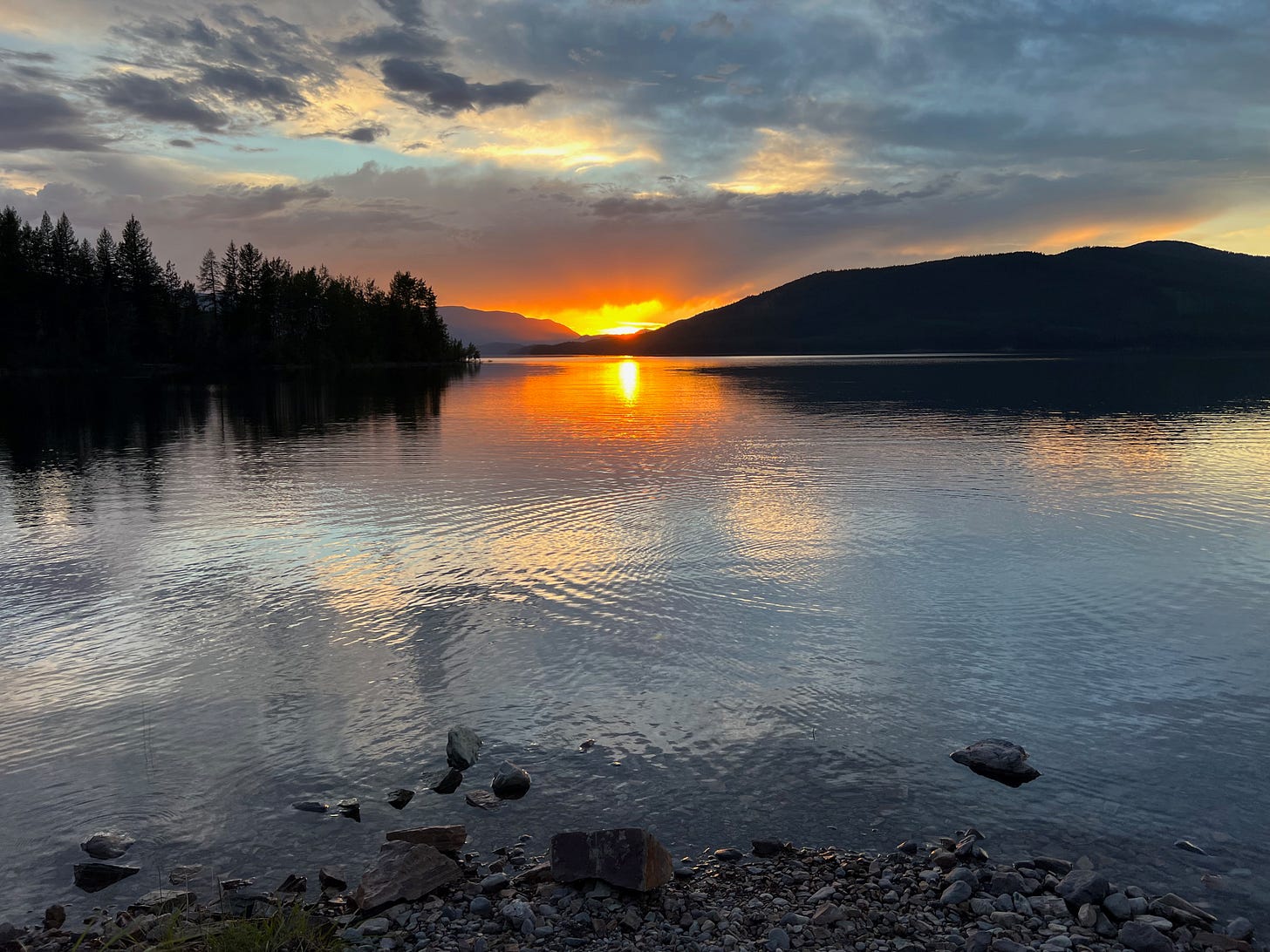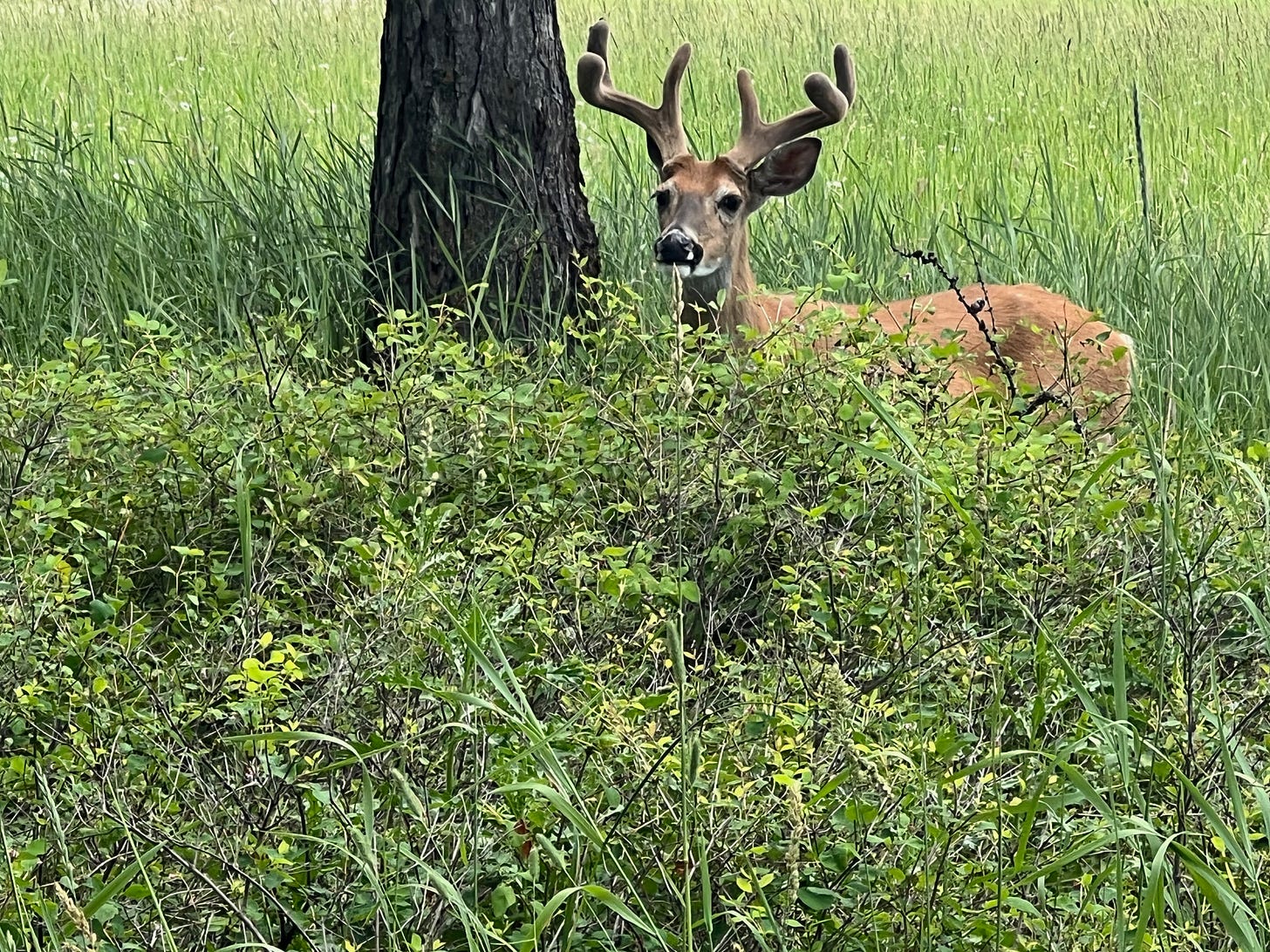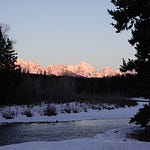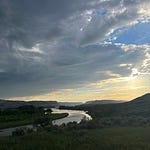I’m experimenting with the audio feature that Substack now offers. It’s called “podcast” but I’m not going to do a podcast. This is a 43-second recording of dawn birdsong from our recent camping trip—usually it’s surround-sound Swainson’s thrush spiraling trills but I only heard one of those. I’ll try to do similar nature recordings now and then, and maybe record some of an in-town walk here and there, nothing more than a few minutes. Also, possibly, short conversations. Maybe.
Also: A few people have emailed to say that the paid subscription link doesn’t work. It’s not live yet, I’m sorry! I’m going to be offline quite a bit over the next 2-3 weeks, and didn’t want to enable the paid version until I can be available to troubleshoot, etc. August 1 or thereabouts.
“When we were river people the sun made an alphabet of light struck trees” —from “River People—The Lost Watch,” by Gordon Henry Jr.*
Last weekend after getting back from camping—having been eaten alive by tiny gnats but mostly missing out on the roaming black bear and hailstorm that punctuated the next couple days—I went to Target to see if I could find a pair of pajamas for my daughter. This is not my favorite thing to do, go to big box stores, but there comes a certain age with kids where Target is one of the few places that carries comfortable clothes in the right sizes and she needs pajamas.
So I went in there and literally took a step back because it looked like a storm had gone through. Clothes were everywhere, dropped on the floor and slipping off of hangers. I was going to browse the kids’ T-shirt shelf but it looked like every single shirt had been shaken out and dumped in a pile, and I didn’t want to make life any more difficult for the lone employee refolding everything.
I would have thought this was the momentary result of a big sale, but my sister had had to go in there the week before and reported the same.
It’s not like I haven’t seen stores in this kind of condition before, but it still gets me stuck on wondering how and why people behave this way. Why do you hang a set of socks on a hook full of underwear when the sock section is a few steps away? How can you drop a shirt on the floor and not pick it up?
It feels similar to how I (try to) train my household to not leave socks and coffee mugs around, and to always change the toilet paper roll when it’s out, because by not abiding by those few expectations, what you’re doing is, consciously or not, assuming someone else will pick up after you. Pick up after ourselves. How hard, truly, is that?
There is a crow with a broken wing near our yard. A neighbor noticed it when walking their dog. I called around and found that the sole licensed wildlife rehabilitator, Montana Wild Wings Recovery (which is a very cool bird rescue place that does presentations for school field trips and various festivals), only works with birds of prey. So we’ve been taking out a little water dish left over from when we had cats, and some sunflower seeds and oatmeal. I think the magpies are getting most of it.
The crows’ friends sound distressed every time we walk by and there’s little we can do except try to steer clear and not be scary. My daughter has been picking up dropped crow feathers and offering them to the towering Douglas fir back there (as thanks to the aforementioned Montana Wild Wings Recovery she knows that it’s illegal to keep wild bird feathers), I’m not sure with what intention but it can’t hurt and it’s better than my instincts were at that age. (Did I have instincts at that age? I mostly stayed inside reading fantasy novels and grumbled when dragged out hiking—which, considering most of my past few years have been spent writing about and advocating for walking and walkability, is a bit ironic.)
It’s one thing to read about the familial care of the crows, but it’s really amazing to see it in person. They’re working so diligently to protect their injured friend. I hope on some level they know we’re on their side.
Fixating on the disaster people left behind them in Target feels a bit like whistling past a graveyard right now, but in a way it’s not. “Someone else will take care of this” is an assumption that underwrites a lot of our structures. “Not my problem.” “I deserve the service and resources that are required to insulate me from the effects that my actions have on the world around me.” It’s a separation, an undoing of interconnection. A belief either that what we do with our own selves has no effect on anyone else (and that nobody has the right to tell us what to do or to expect more of us), or that our position in society and the web of life is such that we have earned the right to make someone else to pick up after us.
I keep trying to tell myself that maybe Target was packed with harried parents or people who had trouble bending over, and I’m sure there were a few of both. Active compassion at work, trying to pretend that what you’re witnessing isn’t active disregard. We all know, though, that it too often is exactly that. That caring is tiring, responsibility a burden, picking up after yourself a pain.
A large part of our work, I think, is learning that all of those things are instead what can make life begin to feel whole again.
*This poem is in Living Nations, Living Words: an Anthology of First Peoples Poetry, collected by Joy Harjo. A few weeks ago my daughter and I attended a presentation on Little Shell Chippewa Métis history and culture given by Chris La Tray and tribal elder Al Wiseman, co-sponsored by Humanities Montana and the Freeflow Institute (listeners of the Mountain & Prairie podcast will have heard Ed mention Freeflow many times). The entire day felt like one huge insight and tremendous privilege after another. I’m so grateful to all who made it happen, especially Chris La Tray and Al Wiseman. Living Nations, Living Words came as part of the Humanities Montana “Gather Round” package.
Bonus photo: This guy, all in velvet, just waiting for me to go away.
Some stuff to read or listen to:
Speaking of Chris La Tray, his essay “Living on the Fringes,” in Whitefish Review Summer/Fall 2022 issue themed “The Vortex,” is worth seeking out. It’s a deft story that moves between policies perpetuating current houselessness and the “Landless Indians” status of the Little Shell Chippewa: “We lost our industry when the buffalo disappeared. We did our best to remake ourselves as farmers, laborers, and sheep and cattle herders. We built settlements along the Milk River, but we weren’t allowed to remain.”
Guy Standing on Frontiers of Commoning about the oceans as a “blue commons” was a fantastic overview of the whole concept of commons, and how those in positions of power craft narratives that justify private ownership of the planet’s abundance.
I appreciated this Mountain & Prairie interview with Dr. Eric Arzubi, co-founder of Frontier Psychiatry, about his work on mental health in Montana, and what it means when a problem has been ingrained for so long that it’s something more than a “crisis:” “A crisis tends to happen in a limited time. A crisis comes and goes. But in my mind if we’re still calling it a crisis years and years later, it’s a systemic, chronic problem.”
Also on Mountain & Prairie, the always delightful and enlightening Betsy Gaines Quammen on public lands, Mormonism, and her book American Zion: Cliven Bundy, God, and Public Lands in the West.
Untangled Roots, a short podcast series on Minnesota Public Radio, gives the history of the destruction of St. Paul’s Rondo neighborhood when the I-94 freeway was built. I particularly recommend Episodes 1 and 3, which delve into what “community” means in the face of laws and policies based on racism, and how community is maintained; and Episode 5, which digs into that necessary question of how we can right the wrongs of history. (Hint: an apology is not enough.)
Legal writer Josie Duffy Rice on Citations Needed podcast talking about the mystique we award to courts and how deference obscures the fact that the law is just a story (a statement that’s abundantly clear if you study iterations of, say, property law over a couple of centuries). Duffy’s interview starts just after 41 minutes in if you want to skip the pre-interview conversation and banter: “Anything can be law, and anything can be politics, and it’s really hard to draw the line between the two of them.”
Speaking of property-law-as-fluid-story, Brian Sawers’s recent essay in The Atlantic on the history of trespass law in the U.S. is a must-read for anyone interested in the subject. As he details, the right to trespass on private or open land was considered fundamental until very recently in American history: “In 1818, and again in 1820, one South Carolina landowner had sued hunters who were ignoring his demand that they leave his land. The state high court sided with the hunters, holding that the right to enter private land was ‘universally exercised’ and noting that merely riding over the soil caused no injury to the landowner.”
And on the subject of the commons, several people sent me Eula Biss’s beautiful piece in the New Yorker on the loss of the commons in England, an historical subject with ongoing ramifications that I refer to and have written about frequently. Glad this topic is getting more mainstream attention, and I wouldn’t be surprised to see a book by Biss on the commons and private property come out of that essay.













Share this post